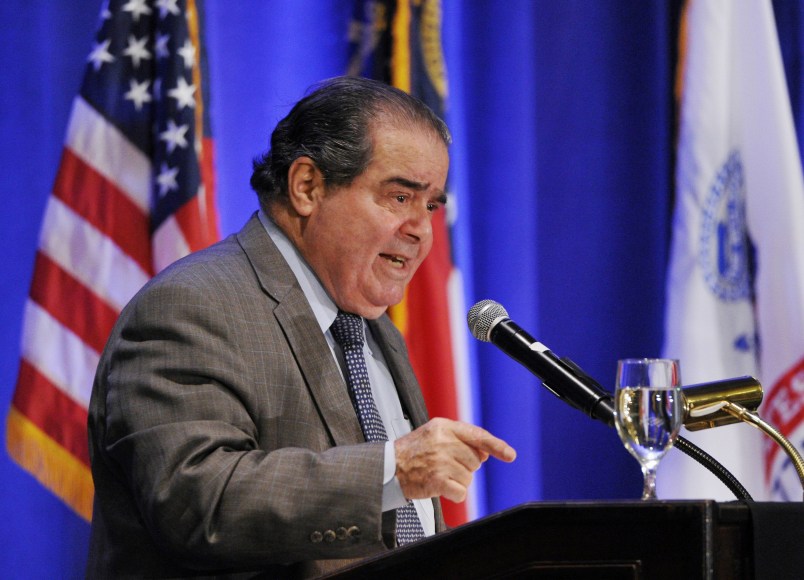The advent of new technologies and government spying in our increasingly inter-connected world has brought a swath of deeply consequential privacy rights cases before the Supreme Court.
Whether it’s privacy in one’s home, car or cellphone, Justice Antonin Scalia has emerged as one of the Court’s most outspoken champions of Fourth Amendment rights in recent years, even if it means breaking faith and siding with liberal justices in closely divided cases.
Scalia’s role as the premier defender of Fourth Amendment rights could be critical in a closely watched case currently before the Court about whether police can search a suspect’s cellphone without a warrant upon arrest.
“Justice Scalia has been on the pro-privacy side of a lot of divided Fourth Amendment cases, especially recently … [and] often very strongly,” said Orin Kerr, a law professor at George Washington University.
In 2012, Scalia wrote the majority opinion reversing a defendant’s conviction because the state gained key evidence by attaching a GPS device to his car. In 2013, he wrote a 5-4 opinion that police may not send a dog to sniff at a front door based on suspicion that drugs were being grown inside. Also in 2013, he wrote the dissenting opinion, joined by three liberal justices, against the court’s 5-4 ruling upholding warrantless collection of DNA from persons who are arrested. Two weeks ago he lead another dissent against a 5-4 ruling permitting a police officer to stop a truck driver based on an anonymous tip that he’s intoxicated.
“Relying on the history of the Fourth Amendment, Justice Scalia has become a frequent champion of broad Fourth Amendment protections — not only joining opinions by his more liberal colleagues, but also often writing powerful opinions in which they join,” said Brianne Gorod, counsel for the liberal Constitutional Accountability Center. “Notably, in every non-unanimous Fourth Amendment case last Term, Justice Scalia sided with the defense.”
During oral arguments last week, the Reagan-appointed justice shed more light on his attitude toward privacy rights in a case about whether police need a warrant to search a cellphone incident to arrest. He openly wondered if police should have some latitude to search a phone if they have reason to believe a bomb will detonate, but insisted the power be limited. If someone is arrested for not wearing a seat belt, Scalia said, “it seems absurd that you should be able to search that person’s iPhone.” (Scholars aren’t sure what the outcome of the case will be.)
Scalia’s support for privacy rights has earned him praise from Justice Ruth Bader Ginsburg, the leader of the Court’s liberal wing, who typically votes with him on Fourth Amendment cases. “Scalia is often criticized by people who would not be labeled conservative. Liberals don’t count his Fourth Amendment cases or the confrontation clause cases. He is one of the most pro-Fourth Amendment judges on the court,” Ginsburg told the Wall Street Journal last week.
The jurist’s views on privacy sometimes brush up against the “confessed law-and-order social conservative” he described himself as in his 2012 book. Indeed, he sides with the government from time to time. In 2013, he voted with his conservative colleagues to deny standing to Amnesty International to challenge the U.S. law that allows for surveillance without showing probable cause that the target is an agent of a foreign power. (The court’s four liberals held that the anti-spying challenge should’ve moved to trial.)
Jonathan Adler, a law professor at Case Western Reserve University, said Scalia’s approach to privacy cases reflects an originalist approach to judging — based on the belief that the Constitution must be interpreted based on its original meaning and intent — and undermines critics’ allegations that he is driven by ideology or results.
“Scalia has often adopted what some consider ‘liberal’ or ‘pro-criminal defendant’ positions. This has not just occurred in the Fourth Amendment context. We also see this in his opinions on the confrontation clause and criminal sentencing,” said Adler, “where he believes the plain text of the relevant constitutional provisions requires the imposition of an absolute, inflexible rule.”
Liberal legal advocates offer qualified praise for Scalia in this area. Caroline Fredrickson, the president of the American Constitution Society, said Scalia has been a leader in privacy cases involving police searches and DNA swabs. She posited that he appeared to be on the side of privacy rights in the warrantless cell phone searches case.
She had her share of criticism, though.
“When it comes to homes, cars and smartphones Scalia’s use of originalism is no hindrance despite technologies unavailable when the Constitution was crafted,” Fredrickson said. “But when it comes to privacy matters concerning women’s bodies and sexuality in general, Scalia is nowhere to be found. The justice’s use of originalism therefore looks opportunistic or irrationally applied.”







Whatever clown Scalia is for or against, it’s usually for the wrong reasons. Another rancid Reagan gift to the nation.
Stopped for a seat belt violation and the cop searches your cell phone? Hmm. Sounds unreasonable to me.
Yes, but will he remember what he wrote in those earlier decisions?
I have to say that, when I read this kind of spin on Scalia (“Well, at least he’s right on this…”), I recall Robert Parker’s best recurring line from his Spenser series of crime novels: “Hitler loved dogs.”
Bullshit! Scalia helped give police the right to enter your home without a warrant less than 2 months ago in a 6-3 decision with the Fernandez case late February:
http://articles.latimes.com/2014/feb/25/nation/la-na-scotus-lapd-search-20140226
Scalia goes along with the liberal judges in the meaningful cases when they are already outnumbered, or when it is a less important case. When it comes to expanding the rights of the police, billionaires, corporations, the powerful, or sliding towards Sharia law, Scalia is front and center.